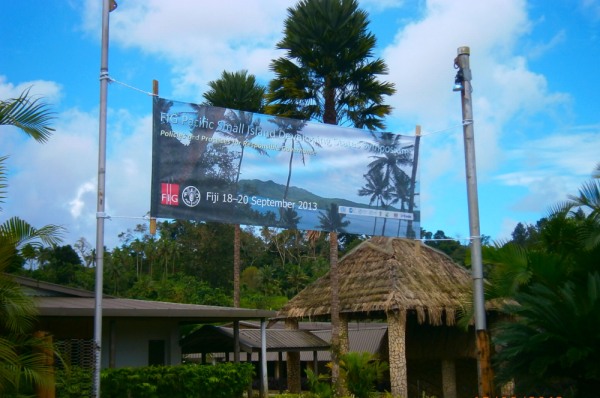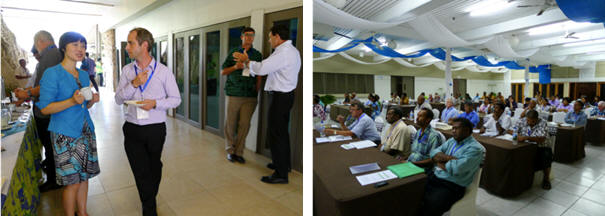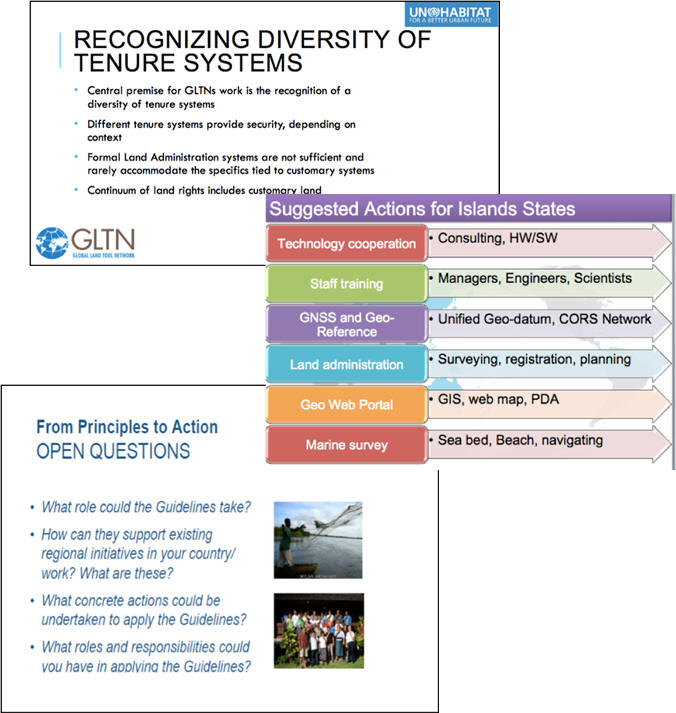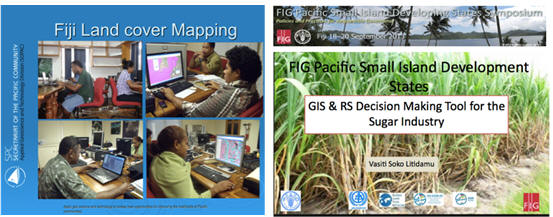
18-20 September 2013, Suva, Fiji
90 participants found their way to Suva to participate in the three day
symposium from the following nations: Australia, Austria, China, Cook
Islands, Fiji, Germany, Israel, Kenya, Kiribati, Malaysia, Micronesia, New
Zealand, Samoa, Solomon Islands, Tokelau, Tonga, Tuvalu, United States and
Vanuatu.

The local organisers had done an amazing work to organise the symposium, and
participants were greeted by a street banner
The overall theme of the symposium was “Policies and Practices for
Responsible Governance”. During the three days focus on the three main
thematic tracks were:
- Improved governance of tenure of land, fisheries and forests through
the implementation of the Voluntary Guidelines on the Responsible
Governance of Tenure;
- Improved geospatial information management through the strengthening
of geodetic reference frame, national spatial information
infrastructure, the creation, sharing and delivery of reliable
geospatial information;
- Securing access to land, land and property rights including the
administering of customary rights and implementing a plurality of tenure
system; Cross-cutting themes included capacity development, professional
development and climate change.
The workshop program was developed with the assistance of FAO, UN-GGIM,
FIG (in particular Commissions 3 and 5 and the Climate Change Task
Force),the Fiji Ministry of Lands and Mineral Resources, the Fiji Institute
of Surveyors (a member association of FIG) and the Global Land Tool Network
Secretariat. The workshop was open to all, with specific emphasis on
participation from Pacific Small Island Developing States.
FAO, UN-GGIM, the Fiji Ministry of Lands and Mineral Resources, the Fiji
Institute of Surveyors and the Global Land Tool Network Secretariat worked
closely together with FIG to organised this special symposium. The symposium
was partly sponsored by FAO and UN-GLTN and funding was additionally and
with great thanks provided by the Fijian Government.
Background
During the XXIV FIG Congress in Sydney, 2010, a seminar was organized in
cooperation with the Food and Agriculture Organization of the United Nations
(FAO) to address the challenges Small Island Developing States are facing in
achieving the Millennium Development Goals (MDGs) and with a special focus
on the South Pacific Region. The Seminar emphasized the importance of good
land governance especially in relation to climate change and natural
disaster; access to land, coastal and marine resources; and secure land
tenure and administration. The seminar adopted the “Sydney
Agenda for Action” that aims at developing the capacity of land
professionals to deal with these challenges. (please also see:
The Sydney declaration).
Further to this the following activites have taken place:
- a UN FAO regional consultation meeting for the Voluntary Guidelines
in Samoa in 2010; and
- an AusAID funded training on land tenure and disaster management in
Suva at the USP in 2012.
As a follow up, the Food and Agriculture Organization of the United
Nations (FAO) and the International Federation of Surveyors (FIG) agreed on
organising this 3-day symposium. The purpose of the symposium was to "Contribute
to the development of an international framework so that countries’
capacities are reinforced for responsible governance of access to, and
secure and equitable tenure of land and its interface with other natural
resources, with particular emphasis on its contribution to rural
development".

Outcome of the symposium
As such, the following outcomes were achieved:
- Dissemination of information regarding global level initiatives
including the United Nations Initiative on Global Geospatial Information
Management, the FAO Voluntary Guidelines on the Responsible Governance
of Tenure and affordable access to land and basic services to surveyors
and related professionals as key land, natural and built environment
professionals at the operative level in the South Pacific Region;
- Engagement of academic and teaching institutions to raise awareness
of key surveying opportunities and challenges in the South Pacific
Region;
- Development of partnerships and networks with surveyors and related
professionals as key land, natural and built environment professionals
in the South Pacific Region; and
- Capacity development of surveyors and related professionals as key
land, natural and built environment professionals in the South Pacific
Region to further the object of the global level initiatives.
A key outcome of the Workshop was
The Suva Statement, which was discussed and agreed upon in the final
session. i
Symposium programme and presentations
The Symposium was structured around plenary presentations, technical
sessions and workshops. The overarching goal was to deliver professional
knowledge, engage professionals and stake-holders and to contribute towards
regional information dissemination and capacity development. The Symposium
program is available on the web site
http://www.fig.net/pub/fiji/techprog.htm. Presentations are available as
hyperlinks from the same site.
A separate report on the UN-GGIM-AP and FIG Commission 5 activities at
the Symposium has been prepared. It is available at:
http://www.fig.net/commission5/index.htm

The Opening Session and Plenaries of the Symposium generally introduced
and expanded upon the key themes and intended outcomes of the Symposium in
the context of the Pacific SIDS. The applicability of the Voluntary
Guidelines to the region was generally acknowledged, as was the need for
appropriate and affordable technology and capacity. Issues of transparency
in governance were continually returned to, as were the challenges of
climate change. Climate change and pervasive new technologies were seen to
be creating a greater imperative for action by surveyors, and also increased
opportunities. The location and size of small island states in the Pacific
region was seen to critically need the adoption of fit for purpose
technologies.

Figure 2: A selection of slides from the
Plenary presentations.
Technical sessions were scheduled for the morning and afternoon of the
second day. Broad topics included the collection, management and display of
geospatial information, hydrography, climate change, land administration,
valuation and geospatial infrastructure. Presenters included professionals
living in the region, as well as experts and organizational representatives
from around the world. Many academics were present, as were industry and
government representatives.

Figure 3: A selection of presentations from the Technical Sessions
Two parallel workshop streams were hosted on the second day. The first
was lead by UN-GGIM, UN-GGIM-AP and FIG Commission 5, whilst the second was
led by the FAO in partnership with GLTN. A report on the FIG Commission 5
and UN GGIM AP jointly organised workshops is available at
http://www.fig.net/commission5/index.htm. A report from the joint
FAO and GLTN workshop is also anticipated.
The Symposium Closing Session comprised a panel of four regional
participants who each presented their key conclusions, roles and actions.
Critical points were addressed in the Suva Statement of the Symposium, which
was discussed and agreed upon in the closing session. These included the
need for partnerships within and beyond the region, the need for the
adoption of fit-for-purpose technologies and the need for strong,
participatory governance. Key concerns raised were included education and
training opportunities in the region, potential liability relating to the
quality and availability of hydrographic data and the future impact of
climate change in the region.
Thanks to the organisers
The workshop program was developed with the assistance of FAO, UN-GGIM,
FIG (in particular Commissions 3 and 5 and the Climate Change Task
Force),the Fiji Ministry of Lands and Mineral Resources, the Fiji Institute
of Surveyors (a member association of FIG) and the Global Land Tool Network
Secretariat. The workshop was open to all, with specific emphasis on
participation from Pacific Small Island Developing States.
FIG expresses a huge thanks to all the involved parties who contributed
and worked hard to make this seminar a success. A special thanks to Fiji
Ministry of Lands and Mineral Resources who both assisted and also help
financially with the seminar.
The final
participant list is available on the conference website.
Many thanks to the local organisers from
Links
Additional Information
Additional information on documents and items discussed at the Symposium
can be found on the following partner websites:
FAO Voluntary Guidelines on the Responsible Governance of Tenure:
http://www.fao.org/nr/tenure/voluntary-guidelines/en/
UN-GGIM Secretariat: http://ggim.un.org
Regional Committee of the UN-GGIM for Asia and the Pacific:
http://www.un-ggim-ap.org
Global Land Tool Network: www.gltn.net
International Federation of Surveyors:
www.fig.net
Kate Fairlie, Chair FIG young Surveyors Network
October 2013
16 October 2013
|

